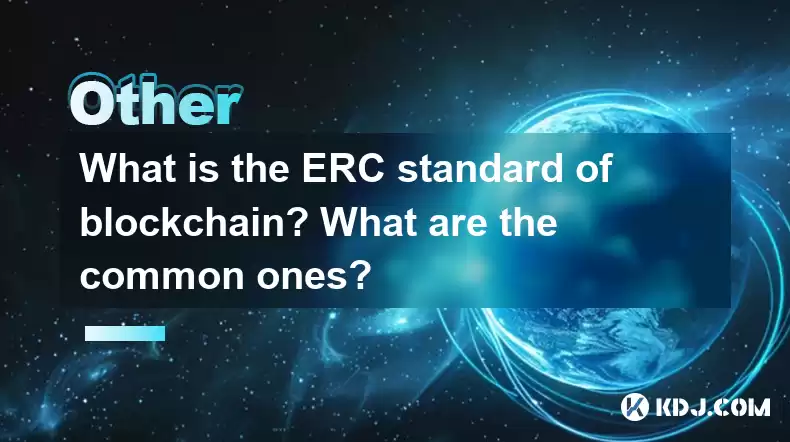-
 bitcoin
bitcoin $94896.319736 USD
-0.39% -
 ethereum
ethereum $3130.546781 USD
-0.60% -
 tether
tether $0.999368 USD
-0.10% -
 xrp
xrp $2.232415 USD
1.03% -
 bnb
bnb $931.833054 USD
0.53% -
 solana
solana $138.573946 USD
-0.08% -
 usd-coin
usd-coin $0.999844 USD
-0.08% -
 tron
tron $0.292320 USD
-0.61% -
 dogecoin
dogecoin $0.159558 USD
-1.12% -
 cardano
cardano $0.489320 USD
-1.89% -
 hyperliquid
hyperliquid $38.634250 USD
0.58% -
 zcash
zcash $700.952791 USD
3.30% -
 bitcoin-cash
bitcoin-cash $486.511218 USD
-3.00% -
 chainlink
chainlink $13.831174 USD
-1.13% -
 unus-sed-leo
unus-sed-leo $9.209054 USD
0.47%
What is the ERC standard of blockchain? What are the common ones?
ERC standards govern token creation on Ethereum: ERC-20 for fungible tokens, ERC-721 for NFTs, and ERC-1155 for versatile token management in games and apps.
May 06, 2025 at 09:07 am

The ERC standard of blockchain refers to a set of rules and standards that govern the creation and functionality of tokens on the Ethereum blockchain. These standards ensure that tokens can interact seamlessly with other smart contracts and decentralized applications (dApps) within the Ethereum ecosystem. The most common ERC standards are ERC-20, ERC-721, and ERC-1155, each designed for specific use cases and functionalities.
What is the ERC-20 Standard?
The ERC-20 standard is the most widely used token standard on the Ethereum blockchain. It was introduced in 2015 and is primarily used for creating fungible tokens, meaning each token is identical and interchangeable with another. ERC-20 tokens are commonly used for utility tokens, governance tokens, and stablecoins.
To be compliant with the ERC-20 standard, a token must implement the following functions and events:
- totalSupply(): Returns the total token supply.
- balanceOf(address _owner): Returns the account balance of another account with address
_owner. - transfer(address _to, uint256 _value): Transfers
_valueamount of tokens to address_to. - transferFrom(address _from, address _to, uint256 _value): Transfers
_valueamount of tokens from address_fromto address_to. - approve(address _spender, uint256 _value): Allows
_spenderto withdraw from your account multiple times, up to the_valueamount. - allowance(address _owner, address _spender): Returns the amount which
_spenderis still allowed to withdraw from_owner. - Transfer(address indexed _from, address indexed _to, uint256 _value): Must trigger on any successful token transfers.
- Approval(address indexed _owner, address indexed _spender, uint256 _value): Must trigger on any successful call to
approve.
ERC-20 tokens are integral to many decentralized finance (DeFi) applications, allowing users to stake, lend, and trade tokens seamlessly.
What is the ERC-721 Standard?
The ERC-721 standard was introduced to facilitate the creation of non-fungible tokens (NFTs). Unlike ERC-20 tokens, ERC-721 tokens are unique and cannot be exchanged on a one-to-one basis. This standard is widely used for digital collectibles, art, and gaming items.
The ERC-721 standard includes the following functions and events:
- totalSupply(): Returns the total token supply.
- balanceOf(address _owner): Returns the number of NFTs owned by
_owner. - ownerOf(uint256 _tokenId): Returns the address of the owner of the NFT.
- transferFrom(address _from, address _to, uint256 _tokenId): Transfers the ownership of an NFT from one address to another.
- approve(address _to, uint256 _tokenId): Allows
_toto transfer the NFT with_tokenId. - setApprovalForAll(address _operator, bool _approved): Enables or disables approval for a third party ('operator') to manage all of
_msgSender()'s assets. - getApproved(uint256 _tokenId): Returns the approved address for a given NFT.
- isApprovedForAll(address _owner, address _operator): Returns true if
_operatoris approved to manage all of_owner's assets. - Transfer(address indexed _from, address indexed _to, uint256 indexed _tokenId): Must trigger on any successful token transfers.
- Approval(address indexed _owner, address indexed _approved, uint256 indexed _tokenId): Must trigger on any successful call to
approve. - ApprovalForAll(address indexed _owner, address indexed _operator, bool _approved): Must trigger on any successful call to
setApprovalForAll.
ERC-721 tokens have revolutionized the digital art and collectibles market, providing a way to prove ownership and authenticity of unique digital assets.
What is the ERC-1155 Standard?
The ERC-1155 standard is a more versatile token standard that combines the functionalities of both ERC-20 and ERC-721. It allows for the creation of both fungible and non-fungible tokens within the same contract, making it highly efficient for games and applications that require multiple token types.
Key features of the ERC-1155 standard include:
- Batch Transfers: Allows for the transfer of multiple token types in a single transaction, reducing gas costs.
- Single Contract for Multiple Tokens: Enables the creation and management of different token types within a single smart contract.
- Safe Transfer Rules: Implements rules to ensure that tokens are only transferred to contracts that can handle them properly.
The ERC-1155 standard includes the following functions and events:
- balanceOf(address _owner, uint256 _id): Returns the balance of a specific token type for a given address.
- balanceOfBatch(address[] _owners, uint256[] _ids): Returns the balance of multiple token types for multiple addresses.
- setApprovalForAll(address _operator, bool _approved): Enables or disables approval for a third party ('operator') to manage all of
_msgSender()'s assets. - isApprovedForAll(address _owner, address _operator): Returns true if
_operatoris approved to manage all of_owner's assets. - safeTransferFrom(address _from, address _to, uint256 _id, uint256 _value, bytes _data): Transfers
_valueamount of tokens of type_idfrom one address to another. - safeBatchTransferFrom(address _from, address _to, uint256[] _ids, uint256[] _values, bytes _data): Transfers multiple token types from one address to another.
- TransferSingle(address indexed _operator, address indexed _from, address indexed _to, uint256 _id, uint256 _value): Must trigger on any successful single token transfers.
- TransferBatch(address indexed _operator, address indexed _from, address indexed _to, uint256[] _ids, uint256[] _values): Must trigger on any successful batch token transfers.
- ApprovalForAll(address indexed _owner, address indexed _operator, bool _approved): Must trigger on any successful call to
setApprovalForAll. - URI(uint256 _id): Returns the Uniform Resource Identifier (URI) for a given token type.
ERC-1155 tokens are particularly useful in gaming ecosystems where players need to manage a variety of in-game assets, both fungible and non-fungible.
How to Create an ERC-20 Token
Creating an ERC-20 token involves writing a smart contract that adheres to the ERC-20 standard. Here are the steps to create an ERC-20 token using Solidity, the primary programming language for Ethereum smart contracts:
- Install a Development Environment: You will need tools like Truffle, Remix, or Hardhat to write, compile, and deploy your smart contract.
- Write the Smart Contract: Below is a basic example of an ERC-20 token contract in Solidity:
// SPDX-License-Identifier: MITpragma solidity ^0.8.0;
import '@openzeppelin/contracts/token/ERC20/ERC20.sol';
contract MyToken is ERC20 {
constructor(uint256 initialSupply) ERC20('MyToken', 'MTK') {
_mint(msg.sender, initialSupply);
}
}
- Compile the Contract: Use your development environment to compile the Solidity code.
- Deploy the Contract: Deploy the compiled contract to the Ethereum network using tools like Truffle or Remix. You will need to pay gas fees for deployment.
- Interact with the Token: Once deployed, you can interact with the token by calling its functions to transfer tokens, check balances, and more.
How to Create an ERC-721 Token
Creating an ERC-721 token involves a similar process to creating an ERC-20 token, but with a focus on non-fungible tokens. Here are the steps to create an ERC-721 token:
- Install a Development Environment: Use tools like Truffle, Remix, or Hardhat.
- Write the Smart Contract: Below is a basic example of an ERC-721 token contract in Solidity:
// SPDX-License-Identifier: MITpragma solidity ^0.8.0;
import '@openzeppelin/contracts/token/ERC721/ERC721.sol';
contract MyNFT is ERC721 {
constructor() ERC721('MyNFT', 'MNFT') {}
function mintNFT(address to, uint256 tokenId) public {
_mint(to, tokenId);
}
}
- Compile the Contract: Compile the Solidity code using your development environment.
- Deploy the Contract: Deploy the compiled contract to the Ethereum network, paying the necessary gas fees.
- Interact with the Token: After deployment, you can mint new NFTs, transfer them, and check ownership using the contract's functions.
How to Create an ERC-1155 Token
Creating an ERC-1155 token allows you to manage both fungible and non-fungible tokens within a single contract. Here are the steps to create an ERC-1155 token:
- Install a Development Environment: Use tools like Truffle, Remix, or Hardhat.
- Write the Smart Contract: Below is a basic example of an ERC-1155 token contract in Solidity:
// SPDX-License-Identifier: MITpragma solidity ^0.8.0;
import '@openzeppelin/contracts/token/ERC1155/ERC1155.sol';
contract MyToken1155 is ERC1155 {
constructor() ERC1155('https://mytoken.com/api/token/{id}.json') {}
function mint(address to, uint256 id, uint256 amount, bytes memory data) public {
_mint(to, id, amount, data);
}
function mintBatch(address to, uint256[] memory ids, uint256[] memory amounts, bytes memory data) public {
_mintBatch(to, ids, amounts, data);
}
}
- Compile the Contract: Compile the Solidity code using your development environment.
- Deploy the Contract: Deploy the compiled contract to the Ethereum network, paying the necessary gas fees.
- Interact with the Token: After deployment, you can mint new tokens, transfer them, and check balances using the contract's functions.
Frequently Asked Questions
Q: Can ERC-20 tokens be used for voting in decentralized governance systems?A: Yes, ERC-20 tokens are often used for voting in decentralized governance systems. Each token holder can cast votes proportional to their token holdings, making it a common method for decentralized decision-making.
Q: Are there any limitations to using ERC-721 tokens for digital art?A: While ERC-721 tokens are excellent for proving ownership of digital art, they can be gas-intensive for large-scale projects. Additionally, the uniqueness of each token can complicate trading and liquidity.
Q: How do ERC-1155 tokens improve efficiency in gaming applications?A: ERC-1155 tokens improve efficiency in gaming applications by allowing for the management of both fungible and non-fungible tokens within a single contract. This reduces the complexity and gas costs associated with managing multiple token types.
Q: Can ERC standards be implemented on blockchains other than Ethereum?A: Yes, many other blockchains have implemented similar token standards inspired by Ethereum's ERC standards. For example, Binance Smart Chain has BEP standards, and Solana has SPL standards, which serve similar purposes but are tailored to their respective ecosystems.
Disclaimer:info@kdj.com
The information provided is not trading advice. kdj.com does not assume any responsibility for any investments made based on the information provided in this article. Cryptocurrencies are highly volatile and it is highly recommended that you invest with caution after thorough research!
If you believe that the content used on this website infringes your copyright, please contact us immediately (info@kdj.com) and we will delete it promptly.
- Bitcoin's Legal Achilles Heel: Nick Szabo Sounds the Alarm
- 2025-11-17 23:15:01
- Stablecoins Take Center Stage: Revolutionizing Cross-Border Trading in Africa
- 2025-11-17 21:40:02
- Navigating the Crypto Market: $HUGS Token vs. Selling Fear
- 2025-11-17 22:10:02
- Mutuum Finance: The Next Cardano in the Crypto Universe?
- 2025-11-17 22:25:01
- CMC20 on BNB Chain: DeFi's Answer to the S&P 500, Ya Know?
- 2025-11-17 21:10:02
- DeFi Strategies Evolved: Shared Capital Takes Center Stage
- 2025-11-17 22:40:01
Related knowledge

What is the difference between a blockchain and a distributed ledger technology (DLT)?
Nov 14,2025 at 08:59pm
Understanding the Core Structure of Blockchain and DLT1. A blockchain is a specific type of distributed ledger technology that organizes data into blo...

What is the history and origin of blockchain technology?
Nov 17,2025 at 05:59am
The cryptocurrency market continues to evolve at a rapid pace, reshaping how digital assets are traded, stored, and perceived globally. With increasin...

How does a blockchain handle data storage?
Nov 14,2025 at 04:40pm
Understanding Blockchain Data Structure1. A blockchain stores data in sequential blocks, each containing a list of transactions or records. These bloc...

What are the risks of investing in blockchain projects?
Nov 14,2025 at 10:19am
Risks Associated with Volatility in Cryptocurrency Markets1. The price of digital assets can shift dramatically within minutes due to speculation, new...

How does blockchain technology apply to intellectual property and copyright?
Nov 16,2025 at 05:20am
Blockchain and Digital Ownership Verification1. Blockchain technology enables creators to establish verifiable proof of ownership for digital content ...

What are the best resources to learn about blockchain?
Nov 16,2025 at 07:59am
Top Online Platforms for Blockchain Education1. Coursera offers university-level blockchain courses from institutions like Princeton and the Universit...

What is the difference between a blockchain and a distributed ledger technology (DLT)?
Nov 14,2025 at 08:59pm
Understanding the Core Structure of Blockchain and DLT1. A blockchain is a specific type of distributed ledger technology that organizes data into blo...

What is the history and origin of blockchain technology?
Nov 17,2025 at 05:59am
The cryptocurrency market continues to evolve at a rapid pace, reshaping how digital assets are traded, stored, and perceived globally. With increasin...

How does a blockchain handle data storage?
Nov 14,2025 at 04:40pm
Understanding Blockchain Data Structure1. A blockchain stores data in sequential blocks, each containing a list of transactions or records. These bloc...

What are the risks of investing in blockchain projects?
Nov 14,2025 at 10:19am
Risks Associated with Volatility in Cryptocurrency Markets1. The price of digital assets can shift dramatically within minutes due to speculation, new...

How does blockchain technology apply to intellectual property and copyright?
Nov 16,2025 at 05:20am
Blockchain and Digital Ownership Verification1. Blockchain technology enables creators to establish verifiable proof of ownership for digital content ...

What are the best resources to learn about blockchain?
Nov 16,2025 at 07:59am
Top Online Platforms for Blockchain Education1. Coursera offers university-level blockchain courses from institutions like Princeton and the Universit...
See all articles










































































